Building Skills to Reduce Alcohol Misuse Among Students on College Campuses: Webinar Recap
Recently, we held a critical roundtable discussion about how building the right skills can help reduce alcohol misuse among college students. In this webinar, we reviewed recent efficacy data, discussed strategies for reducing alcohol misuse on campus, and presented a brief demo of our training for students entitled Alcohol & Other Drugs.
This webinar was conducted by a panel of esteemed subject matter experts, educators, and researchers.
Nikita Khalid, MS, has a background in educational psychology and is currently enrolled in a doctoral program at the City University of New York Graduate Center. Nikita is also a Research Scientist at Kognito.
Glenn Albright, PhD, is a clinical psychologist and professor in the Department of Psychology at Baruch College, City University of New York. He is also the Co-Founder of Kognito.
Kim Wieland, MPH, has a background in education and public health and is currently the Product Lead for Higher Education at Kognito.
Continue reading for highlights of the webinar or watch the full recording here.
The State of Mental Health, Alcohol, and Drug Use Among College Students
College students are going through a lot. This fact isn’t new. When going to college, students are looking to explore, try new things, and find a place where they belong while also meeting the academic and social expectations of their university. Although this webinar is about the misuse of alcohol, it’s important to remember that there are underlying factors, such as mental health struggles that can contribute to misuse. According to the American College Health Association National College Health Assessment, 37.9% of college students felt things were hopeless, 26.8% felt worthless, and 35.8% felt anxiety affected academic performance.
When it comes to alcohol and drug use, according to the 2021 Monitoring the Future Study, 30% of students drink five or more drinks in a row and there has been a 5% increase in marijuana use in the past 10 years. “We really want to make sure that we are able to build programs that address [binge drinking and drug use] and speak to all different types of students, their motivations, and where they’re coming from,” said Kim Wieland.
Motivation is the energy that drives behavior. Through evidence-based strategies and root cause analysis, we are discovering what the motivators are in alcohol and drug use. Kim goes in-depth of what these motivators are, and the models and skills Kognito’s practice-based training, Alcohol & Other Drugs, teaches students. For each student, motivators are unique and influenced by their past experiences, attitudes, and expectations toward alcohol and other drugs, self-imagery, identity, and more.
Kognito’s Learning Methodologies
Glenn Albright discusses how virtual humans are an efficacious way to teach evidence-based strategies. The instructional benefits of interacting with virtual humans includes:
- Feeling safe to self-disclose and experiment with different answers
- An increase in engagement and openness
- Decrease in transference reactions
- Decrease in social evaluative threat
In our post-surveys with students who have completed the simulation, we ask, “Now that you have taken the training, what is a situation you would have handled differently?” One student said, “I recently confronted my friend about her drinking habits because I was truly concerned for her health and well-being. She was always the drunkest one at the party, and though she was going through a difficult time, it was her way of coping. I sometimes felt embarrassed for her. I would get frustrated at her being sloppy or too rowdy when no one else was acting that way. I didn’t handle some of those situations well. If I could go back in time, I would be more considerate and try to be more proactive like Eve was.”
Kim discusses the content overview of our product Alcohol & Other Drugs. There are five modules in this training:
- Module 1: Choose Your Coach. Students learn effective techniques in approaching a peer who has shown signs of distress, including avoiding negative labels and using nonjudgmental labels.
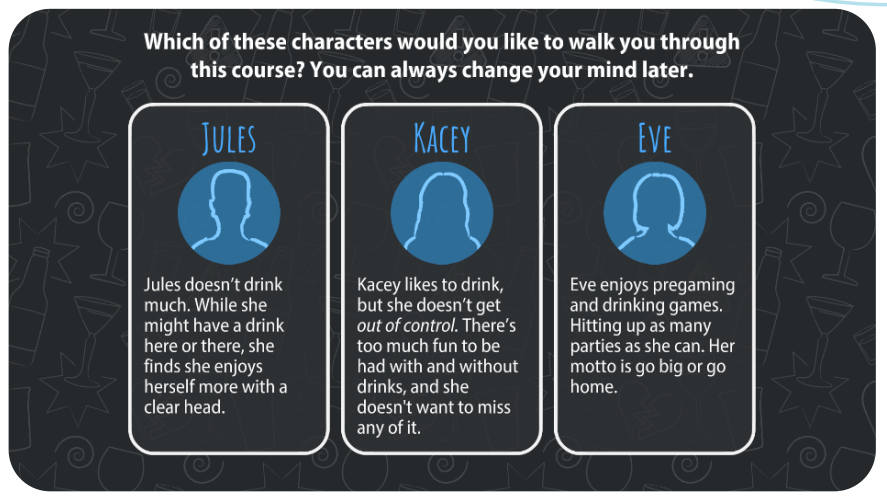
- Module 2: Choosing Your Limits. The student coach discusses social norming information, making healthy choices, limit-setting, and refusal skills. Assuming the role of a virtual student, learners must set their limits before attending a party. As they interact at the party, learners utilize the skills taught to determine how and if they will stick to their limits.
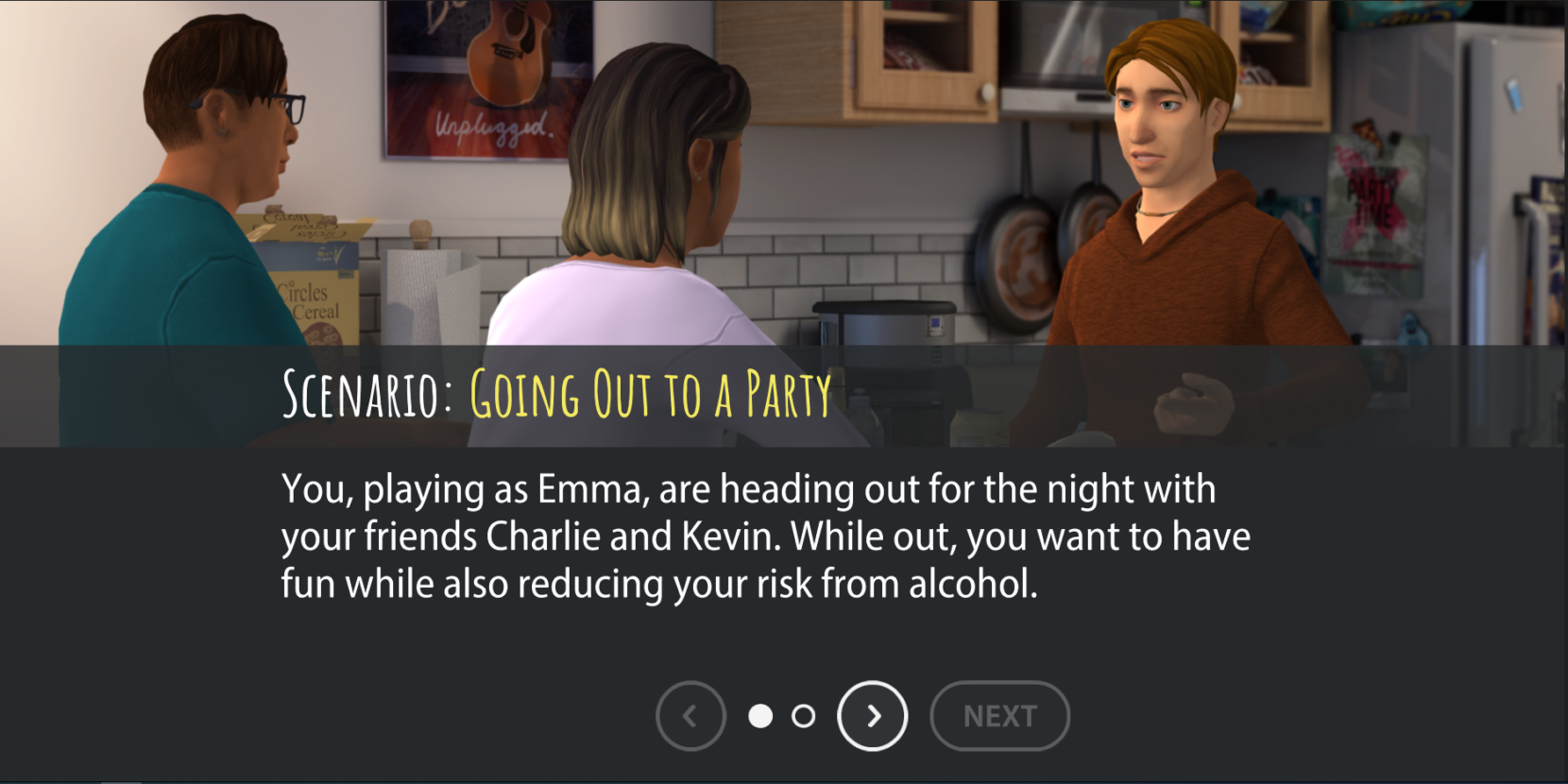
- Module 3: Looking Out for a Friend. The student coach explains the three Ds of bystander intervention: delegate, direct, and distract. Then, they use these skills to navigate a situation where a fellow student is drinking too much at a party.
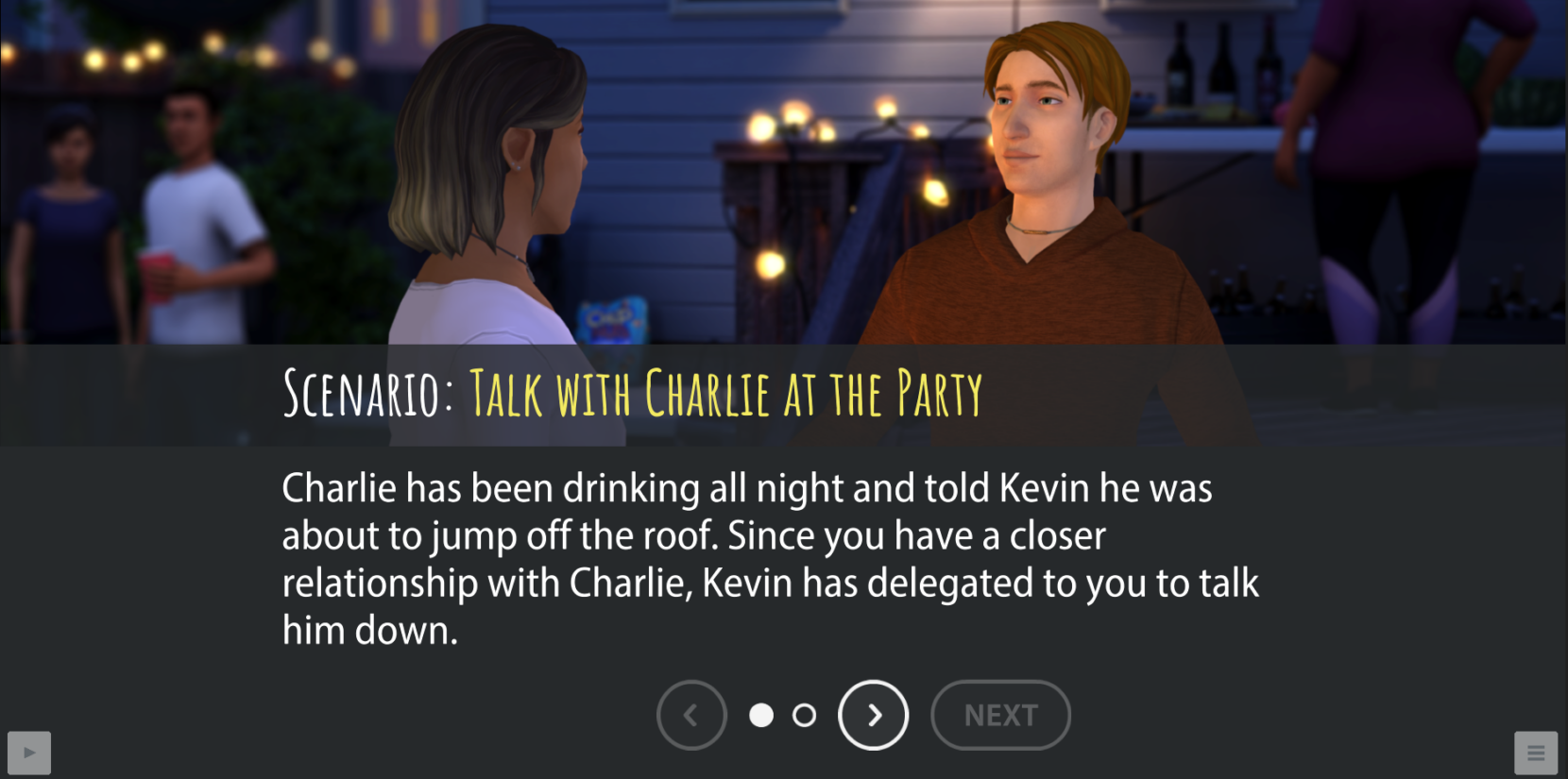
- Module 4: Recognizing a Pattern. The student coach talks about patterns of high-risk behavior. They practice communicating effectively with a friend they are concerned about. The evidence-based strategy of motivational interviewing is utilized in this module.
“One of the most profound strategies are drawn from motivational interviewing, which has shown to be an incredibly effective way of communicating with people and identifying intrinsic motivators that bring about changes in behavior.” – Glenn Albright
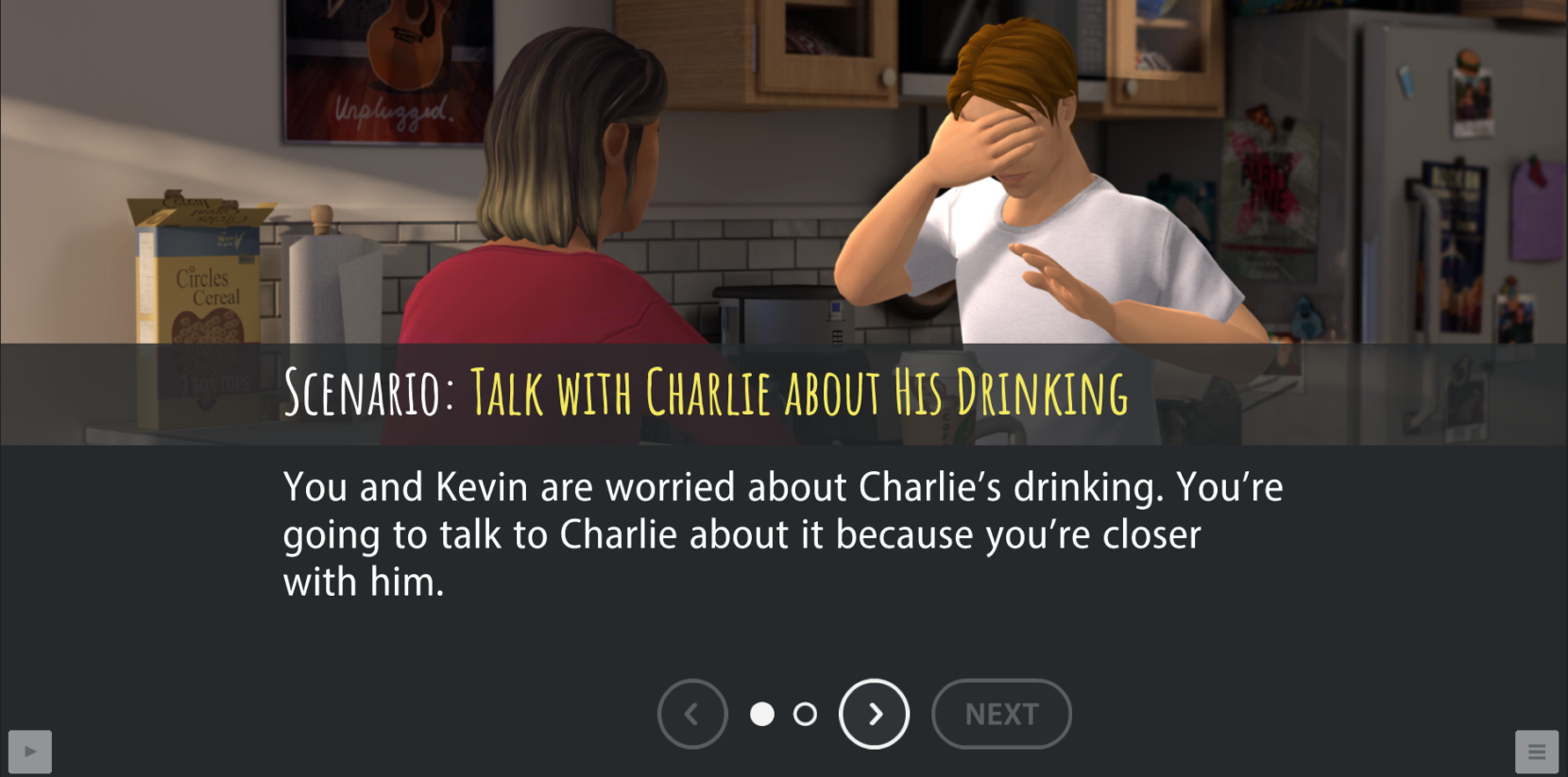
- Module 5: Stay True to You. The student coach concludes with an exercise around goal setting. Students identify their personal motivators and set intentions for healthy decisions.
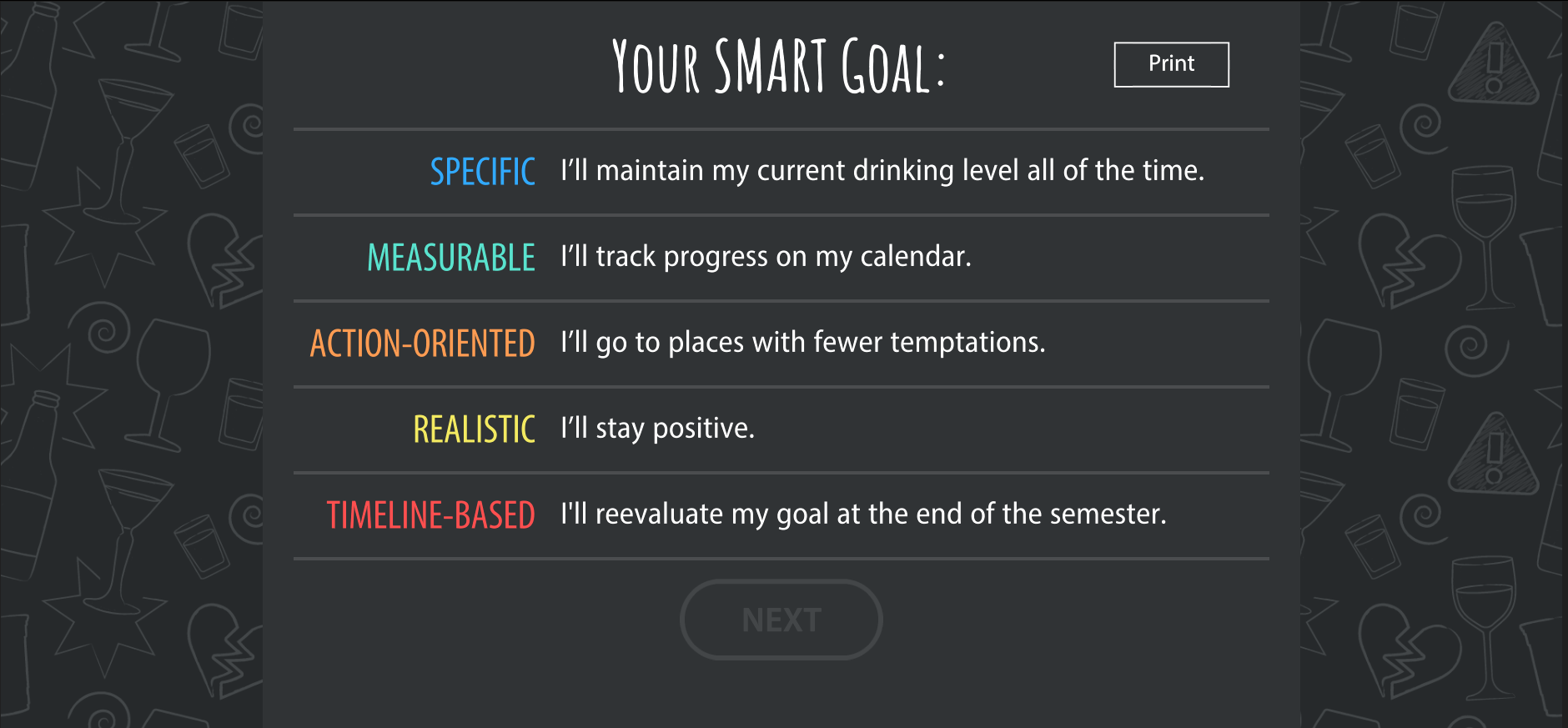
For an inside look of this training, check out the demo played in the webinar or request an interactive demo here.
Summary of Findings from an Efficacy Study
In this portion of the webinar, Nikita Khalid walks through the results of the efficacy study across a number of different institutions in the United States. One of the major findings of this study was that after taking the Alcohol & Other Drugs program, students had higher levels of agreement with items that state the importance of setting drinking limits and sticking to them, both for themselves and for others. In addition, there was a 7% increase in the number of students indicating they wanted to reduce their alcohol consumption immediately after completing the program.
“This is a wonderful finding because the intent of the student, as well as their agency that they feel, are going to be cumulative and come together in an actual behavioral change that we can look at long-term.” – Nikita Khalid
Students who took the training were significantly more confident and likely to identify warning signs of a potential high-risk incident, prevent an incident from happening or step in during an incident, recognize warning signs, talk with their friends about concerns, and talk with friends about supportive resources. All participants completed a pre-survey (baseline) assessment, the simulation, then a post-survey immediately after.
Here are the satisfaction results from this study:
- 97% rated this training as “excellent,” “very good,” or “good”
- 85% indicated that the training was based on scenarios relevant to them
- 86% indicated that they would recommend the training to other students
- 86% indicated that they are likely to use information from this training
For more findings for behavioral intent, self-efficacy, and user feedback see the full webinar.
Watch the Full Webinar!
Interested in learning more about skill-building techniques to reduce alcohol misuse on college campuses? Watch the full webinar here or contact us to learn more about our training for students, Alcohol & Other Drugs.